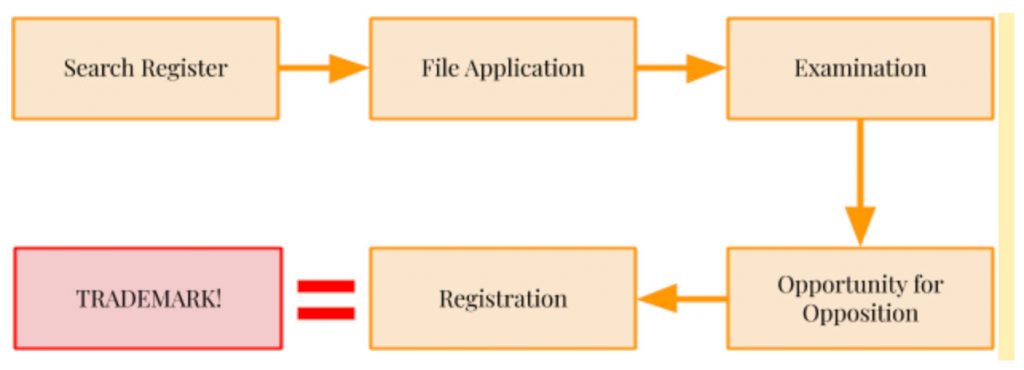Menu
Applying and registering a trademark involves a multiple stage process. Essentially there are 5 stages, though the process doesn’t always move in a strictly linear movement. Those stages are:
- Searching the register
- Filing the application
- Examination
- Opposition
- Registration

Can your IP be trademarked?
The first step is to be sure that the specific element of your IP is suitable to be trademarked. Trademarks are not limited to logos and names; they can include words, phrases, movement, sound, images, even smells or a combination of these elements. Some thins cannot be trademarked – descriptive words, geographical names, common surnames and common symbols.
Searching
Before filing a trademark application, it is valuable to conduct a trademark search via IP Australia’s free search system, as well as internationally if you’re considering conducting business in other countries.
It is recommended to search as widely as possible. Searches will indicate whether a trademark application is worthwhile or appropriate and will help define whether your new product name or logo can be sufficiently protected by trademark registration or is likely to conflict with other similar registered trademarks.
Filing An Application
Filing a trademark application is essentially the determinative step as any errors or mistakes will likely result in rejection, thus, making it the most tedious stage. Upon filing an application, you must consider a number of factors which include:
- Whether you will apply through the standard online method, the TM Headstart method, and;
- The appropriate class or classes of goods and services to place it under.
Examination
Filing your trademark application does not involve an instant determination but is the beginning of a lengthy process. After submitting your trademark application, it will go into a stockpile to be examined by IP Australia. As an applicant there is nothing that is required of you during the examination stage besides patience. IP Australia will review your application to ensure it contains all the correct information satisfying legislative requirements.
If your trademark application is considered erroneous you will receive an adverse examination report outlining the identified problems and any options for overcoming the identified problems. You have 15 months from the date of the adverse report to address any issues with your application which is accomplished by responding through submissions in writing containing supporting evidence. If these problems cannot be corrected then your trademarking process will come to a halt and you may need to re-submit a new application.
Acceptance
If your trademark application satisfies the examination stage or you are able to overcome the adverse findings then a notice of advertisement of acceptance will be sent to you. Acceptance is distinguished from registration. At this stage your trademark is basically accepted but unregistered.
Opposition
Given that your trademark application meets the legal requirements and no mistakes are detected, acceptance will be advertised in the Australian Official Journal of Trade Marks for a two month period allowing third parties to oppose the registration. In the event opposition is made to your trademark application, it is critical to file your notice of intention to defend by the prescribed deadline.
Registration
If your trademark application is not opposed within the two month period or you are able to resolve an objection in favour of yourself then your trademark will be registered. You will be notified in writing by IP Australia. Your trademark application’s status will also be updated to ‘registered’ in both Australian Trade Mark Search and the Australian Official Journal of Trademarks. Your item has now been trademarked!
If you would like to speak with our IP lawyers, just contact us via 1300 337 997 or by filling out the contact form.


